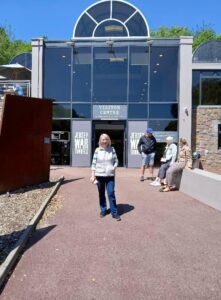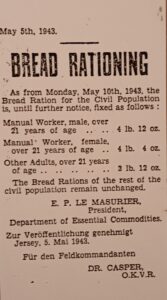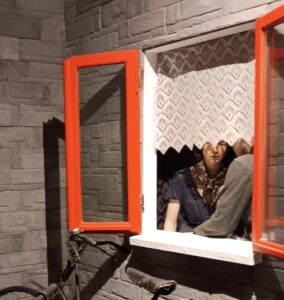Life Under the Nazi Jackboot in the Channel Islands – By Trish Wade

Trish stood near the museum entrance.
Following on from Trish’s previous article, in today’s #ForgottenFriday we are looking at the life under Nazi occupation in the Channel Islands.
When Germany took the Channel Islands from the British in 1940, they were able to march straight into the Islands unchallenged. Great Britain had decided that to try and defend them would lead to greater loss of life for the local population than they would suffer under the hands of the Germans.
Before the Occupation started people were given the chance to evacuate or stay. In the end most of them stayed because the conditions they witnessed for those leaving were fairly appalling, so they decided to stay.
By the end of 1941 there were around 11,500 Germans on Jersey alone and the locals were wondering how their lives were going to be affected by all the soldiers now occupying their Island.
All the Islanders were issued with Identitaetskartes (Identity Cards) with their personal details and photographs.
Food shortages meant rationing and Islanders had to learn to be very resourceful. They began to develop what is known as ‘Ersatz’ foods, such as tea made from dried bramble leaves, coffee from acorns, for a sweetener they used sugar beet syrup and certain types of seaweed for cough syrup and a setting agent for jellies etc.

Make do and mend was the watch word on the Islands as it was in the UK. Clothes made from recycled curtains and blankets, shoes resoled using wood and old rubber. Make-up was difficult to get and the ladies found it hard to get hold of stockings. Real soap was also scarce using sand mixed with ash for soap and most surprisingly toothpaste made from caustic soda.
The Germans had a curfew on the gas supply, which was cut off at 8 o’clock each evening, so it became a way of life gathering up any wood and twigs that could be burnt. To help with fuel conservation, communal bakehouses and soup kitchens opened up for all to share.
The Islanders developed a bartering scheme too and through the classified columns of the Evening Post newspaper they would swap anything they could, like a chair for a bicycle inner tube for example. For those who could afford it there was always the black market for goods which were smuggled in from France or stolen from the German garrisons.
Private cars were banned so bicycles became a much-coveted mode of transport as well as horse and carts. When tyres were not available, Islanders resorted to using hose pipe to cushion their wheels.
Schools were kept open during the occupation but tended to be for shorter hours because of the cost of heating. By 1943 it became compulsory to learn the German language.
The Islanders were not completely cut off from their friends and relatives in England as through the Red Cross they could write letters with up to 25 words to them.
Living in such close proximity to the Germans, it is little wonder that some of the Islands women and girls became attracted to the handsome soldiers and took advantage of all they had to offer, including special privileges such as jobs for family members and receiving gifts and going to parties with them. Women who fraternized with the Germans were very unpopular with the locals who referred to them as ‘Jerry bags’ and could not be trusted.

Photograph Taken by Trish at the Jersey War Tunnels
Islanders who worked for the Germans were often resented too but the lure of good pay was too good to resist for some. The seeds of resentment caused a lot of mistrust, even between friends, and people would tell tales to the Germans to get their own back. Anonymous letters would be sent, and the Germans encouraged it by offering large rewards.
Many Islanders put themselves in considerable danger by being defiant against the German occupiers. The V for Victory campaign started in 1941 and many started painting the V sign on walls, doors and gateposts. A whole community could suffer if a sign appeared in their area. Whilst the Germans sent out leaflets warning of the consequences of these actions and offered rewards for whistleblowers, they eventually claimed the V sign as their own ‘V for Viktoria’. This action put an end to the campaign.
Patriotic Islanders did form groups of Resistance, defying the severe penalties that would be meted out if discovered. They learnt how to build their own crystal radios sets and also find many ways of hiding an illicit radio . The penalties following the discovery of such things were harsh, namely they could be sent to Germany to ‘work education camps’, a cover for dishing out brutal treatment to the prisoners.
There were often tragic consequences for some of the young Islanders who tried to escape from the Islands, whether they were trying to get to England or France (after D Day), some drowned, some were recaptured and put in prison and one young 21-year-old was shot and killed on the beach.
Following the Liberation of the Islands in May 1945, there were of course the usual celebrations but, however, also a lot of the resentment that had built up in the local communities spilled over and those who were viewed as collaborators and Jerry bags were attacked by angry crowds, most giving themselves up to Police custody for protection. British officials eventually left the Islanders to sort things out amongst themselves.
Throughout the occupation the Islanders were determined to keep up their spirits and survive the war the best they could. It was another difficult time in the history of the Islands but for the main part they tried to embrace the ‘Bulldog spirit’ which had sustained the UK through the war. They had concerts, plays and dances, sometimes all night parties (defying the curfew). It was such fortitude that helped them survive such trying times.

Trish stood near the museum entrance.

